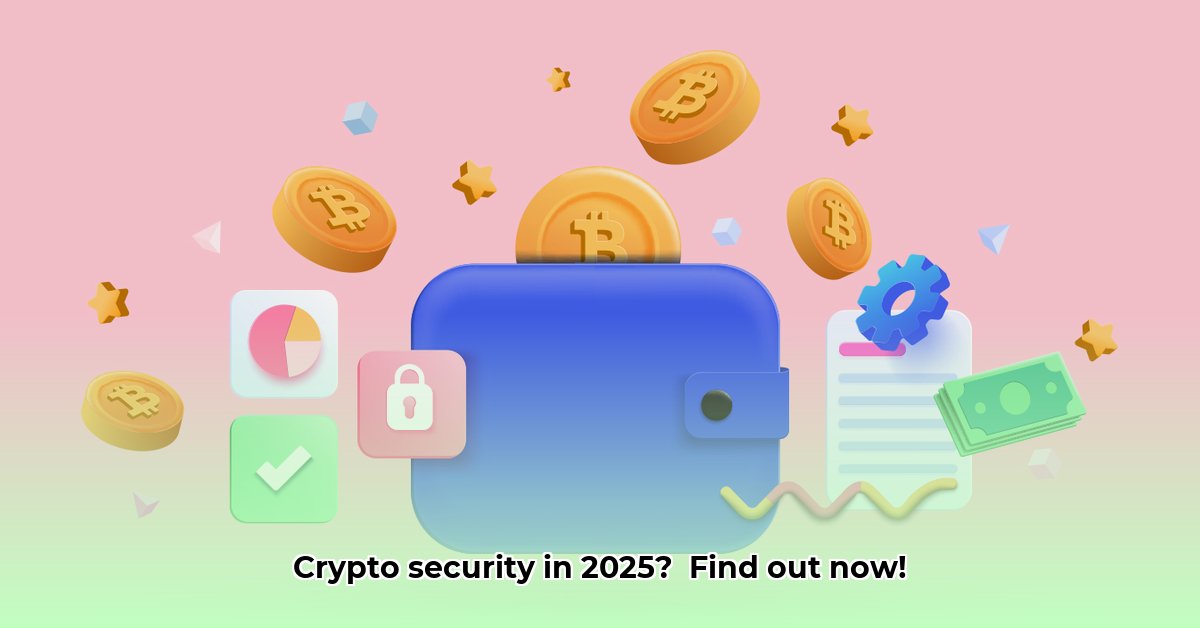Protecting your cryptocurrency can feel like navigating a minefield, but it doesn’t have to be. This guide will walk you through simple yet powerful steps to keep your digital money safe and sound. We’ll cover the basics of choosing the right wallet (hardware vs. software – we’ll explain the difference!), show you how to set it up securely, and give you practical tips to avoid scams that could cost you big time. We’ll also share strategies to protect your investments in the years to come, drawing on tried-and-true methods that the crypto community uses. No matter your experience level, you’ll walk away with the confidence to keep your crypto safe. For up-to-the-minute price quotes, check out these crypto price quotes.
Crypto Security Best Practices 2025: Keeping Your Digital Dough Safe with Enhanced Measures
Protecting your cryptocurrency is like guarding a valuable treasure. The digital world constantly evolves, and so do the threats. Let’s explore smart strategies to keep your crypto safe and sound in 2025 and beyond, focusing on digital asset protection and risk mitigation. This isn’t about scaring you; it’s about empowering you to take control of your digital assets and ensuring long-term crypto security.
Hardware Wallets: The Digital Fort Knox for Your Crypto Holding
Imagine a super-secure vault for your money – that’s basically what a hardware wallet is. It stores your crypto’s secret keys offline, making it incredibly tough for hackers to get at your funds. It’s like having a Fort Knox in your pocket! Remember the old saying, “Don’t put all your eggs in one basket”? The same applies here; diversify your crypto storage and digital asset safeguarding.
- Pick a reputable brand: Do your homework! Choose a well-known and trusted hardware wallet maker, such as Ledger or Trezor. Don’t just grab the first one you see; research best hardware wallets for cryptocurrency, comparing security features and user reviews. A good starting point is to consult expert opinions and security audits available on sites like CoinGecko.
- Guard your seed phrase like it’s the combination to your safety deposit box: This secret phrase, typically 12 or 24 words, is essential to accessing your crypto. Write it down carefully, store it securely (perhaps in a fireproof and waterproof safe), and NEVER share it with anyone – not even under the guise of customer support. Consider using a metal seed phrase storage device for added protection against fire and water damage. This is crucial for secure key management.
- Keep your wallet’s software updated: Just like your phone gets updates, your hardware wallet needs them too. Regular updates patch security holes, protecting against the latest vulnerabilities. Think of it as installing a new security system for your vault; ensure firmware updates for cryptocurrency.
Software Wallets: Convenience with a Side of Caution on Digital Asset Risks
Software wallets are like having quick access to your cash – easy and convenient. However, they’re not as secure as a hardware wallet. They’re more vulnerable to online threats, like malware and nasty phishing scams, thereby increasing digital asset risks. Examples of popular software wallets include MetaMask, Trust Wallet, and Exodus.
- Only use wallets from well-known, trustworthy companies: Stick to the big players with a solid reputation; select reputable software wallets. Look for wallets with a history of security updates and positive community feedback. Consider the wallet’s integration with hardware wallets for added security.
- Enable two-factor authentication (2FA): It’s like adding a second lock to your digital door. It significantly increases security, preventing unauthorized access even if your password is compromised. Use an authenticator app like Google Authenticator or Authy for stronger security than SMS-based 2FA.
- Be super careful about phishing scams: Phishing emails and messages try to trick you into giving up your information, such as your private key or seed phrase. Always double-check any requests before acting on them. Never trust a link or email out of the blue; enhance your phishing scam awareness. Verify the sender’s address and look for any inconsistencies in the message.
Password Power: Your First Line of Defense Against Cyber Threats
Strong passwords are the foundation of good crypto security and are vital for data encryption. A weak password is like leaving your house door unlocked – an invitation for trouble!
- Create long, complex passwords: Think of a sentence or phrase you can easily remember but is hard to guess, mixing capital and lowercase letters, numbers, and symbols. Aim for at least 16 characters and avoid easily guessable information like birthdays or pet names.
- Use a unique password for every account: Don’t reuse the same password for your email, crypto exchange, and social media. If one account gets compromised, the damage is limited. This is especially important for accounts holding or managing cryptocurrency.
- Consider a password manager: These tools, such as LastPass or 1Password, help you create and manage strong, unique passwords without losing your mind trying to remember them all and reinforce your password management strategy. They also offer features like password generation and secure storage.
Navigating the Wild West of Smart Contracts and DeFi with Diligence
Decentralized finance (DeFi) offers exciting opportunities, but also some serious risks. It’s a bit like the Wild West – exciting but potentially dangerous if you’re not careful. What measures can you take to enhance decentralized finance security?
- Always check if a smart contract has been audited by a reputable third party: Think of an audit as an inspection to make sure everything is safe and secure. Look for audits from well-known firms like CertiK or Trail of Bits. An audit doesn’t guarantee perfection, but its absence is a major red flag; demand smart contract auditing. Check platforms like DeFi Safety for independent security assessments.
- Educate yourself before jumping in: Don’t invest in something you don’t fully understand. Do your research, enhancing your digital finance education. Understand the risks involved, including impermanent loss, smart contract vulnerabilities, and rug pulls.
- Start small: Don’t risk a huge amount of money on untested platforms or contracts. Begin with a small amount to test the platform and understand how it works before committing larger sums. Set stop-loss orders to limit potential losses.
Phishing and Social Engineering: The Human Factor in Cybersecurity
People are often the weakest link in security. Phishing attacks, which look like legitimate requests but are actually scams, are constantly evolving. How can you improve your phishing scam awareness?
- Always double, even triple-check any request before sending your crypto: Don’t rush; take your time. Never click on suspicious links from unexpected sources. Verify the recipient’s address carefully, as scammers often use similar-looking addresses to trick users.
- Report any suspicious activity immediately: Help protect others by reporting phishing scams and other suspicious activity to the exchange, wallet provider, and relevant authorities. The Anti-Phishing Working Group (APWG) is a good resource for reporting phishing attacks.
Staying Ahead of the Game: Continuous Learning & Threat Intelligence
Cryptocurrency security is an ongoing journey. New threats emerge all the time, so staying informed is crucial. What are the current risk categories in crypto security?
| Risk Category | Ways to Reduce the Risk |
|---|---|
| Phishing Attacks | Verify every communication, avoid shady links. Use a password manager and enable 2FA. |
| Smart Contract Exploits | Thoroughly scrutinize contracts before interacting with them, limit your exposure. Use reputable DeFi platforms. |
| Hardware Wallet Theft | Keep it safe and secure, physically and digitally! Use a strong passphrase and consider a multi-sig setup. |
| Software Wallet Hacks | Use reputable wallets and enable two-factor authentication. Keep your software updated and avoid public Wi-Fi. |
| SIM Swapping | Use app-based 2FA instead of SMS. Contact your mobile provider to add extra security measures to your account. |
Remember, security is a continuous process, not a one-time fix. Stay informed, stay vigilant, and stay safe! The crypto world is dynamic, and your vigilance in learning and adjusting your strategies is your best defense. Follow leading crypto security experts and news outlets on platforms like Crypto Twitter to stay informed about the latest threats and vulnerabilities.
How to diversify cryptocurrency cold wallet storage strategies in 2025 to Minimize Cryptocurrency Loss
Key Takeaways:
- Hardware wallets are your best defense against online attacks. But, they aren’t foolproof.
- Your seed phrase is the key to your kingdom. Protect it fiercely.
- Diversification is key. Don’t put all your digital eggs in one basket.
- Regularly review and update your security measures. Crypto threats evolve constantly.
- Consider advanced methods like multi-signature wallets for enhanced security and multi-factor authentication.
Understanding the Need for Diversification Beyond Cryptocurrency Exchanges
In 2025, simply owning a hardware wallet isn’t enough. Think of it like this: you wouldn’t keep all your physical cash in a single, easily accessible location. The same principle applies to your cryptocurrency holdings. How to diversify cryptocurrency cold wallet storage strategies in 2025 requires a multi-pronged approach. Why? Because even the most secure hardware wallet is vulnerable to physical loss, theft, or malfunction. Diversification minimizes your risk and reduces overall cryptocurrency loss. Remember the
- Uncover Timeless Ancient Greece Female Names: A Guide to Choosing the Perfect Name - August 9, 2025
- Explore Ancient Greece Artifacts: Unveiling Iconic Treasures - August 9, 2025
- Unveiling Ancient Greek Marriage: Customs & Laws Revealed - August 9, 2025
















